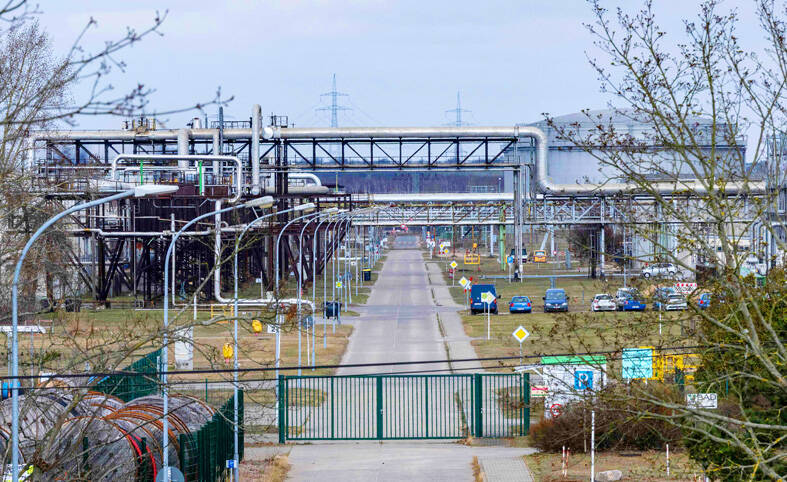No Russian oil has been delivered via the Druzhba pipeline to the PCK refinery in Germany in more than two years because of sanctions levied against Moscow following its full-scale invasion of Ukraine.
However, with the plant in the town of Schwedt on the border with Poland struggling to adapt to processing other raw materials, calls are growing louder for a return to the good old days.
“Many people, especially in Schwedt, see it as conceivable and desirable that oil could once again flow via the pipeline,” said Hans-Joachim Hoeppner, leader of the city council.

Photo: AFP
Having to accommodate different types of oil at the plant, which employs some 1,200 people, has made production less “effective,” said Hoeppner from the center-right Christian Democratic Union.
The idea of reopening the door to the European market for Russia has up until now been firmly dismissed by officials in Berlin, but the thaw in US relations with the Kremlin instigated by US President Donald Trump since his return to office has raised hopes of a possible agreement on a ceasefire in the Ukraine war.
“If changes are happening in the relationship with Russia... then I think it is very possible that there is Russian oil,” Hoeppner said.
German sanctions on Russian oil brought a halt to deliveries of crude via the Druzhba pipeline — Russian for “friendship” — at the start of 2023.
Since then, the refinery in Schwedt has been drawing substitute supplies via a pipeline to Rostock, as well as small volumes through the Polish port of Gdansk and from Kazakhstan.
The changes have left the plant operating at about 80 percent capacity and firmly “in the red,” said Danny Ruthenburg, head of the works council.
A “solution” is urgently needed to keep the refinery running and save jobs locally, said Ruthenburg — whether that means more oil from Rostock or via the Druzhba pipeline after an end to the war in Ukraine.
Brandenburg Premier Dietmar Woidke of the Social Democratic Party last month signaled that he might be open to the return of Russian oil.
“I would be pleased if we could return to normal economic relations with Russia,” Woidke said, adding that the refinery is a “hugely important” player in the region’s economy.
Others have been more explicit in their demands. “Lift the sanctions, because they only hurt us more than the Russians,” said Peggy Lindemann, a member of the works council and city councilor for the far-right Alternative for Germany.
When Russian oil was withdrawn from Schwedt, the government promised to prepare a switch to the production of hydrogen — but the plans have stalled, leaving the plant in limbo.
The situation is also complicated by the fact that the PCK refinery is majority-owned by Rosneft Deutschland, a local subsidiary of the Russian oil giant, and managed through a trusteeship by the German government.
Berlin’s control over the Russian asset, justified as a measure to protect critical infrastructure, was prolonged last month with a renewed promise that Rosneft would sell its interest.
However, finding a buyer would likely be challenging as long as the business still has to contend with oil sanctions.
Talks have recently been reported on the possible revival of another seemingly stranded Russian fossil fuel project, the Nord Stream gas pipeline network.
Russian Minister of Foreign Affairs Sergei Lavrov last month said that discussions had taken place between US and Russian officials on reviving the pipelines — even if it seems highly unlikely that Berlin would give the green light to such a project.
The Schwedt plant has also been mentioned in US-Russia talks, a report by the German investigative Web site Correctiv said.
“In principle, it would be a solution... it would create security,” Hoeppner said. “I don’t have anything against it.”

‘HYANGDO’: A South Korean lawmaker said there was no credible evidence to support rumors that Kim Jong-un has a son with a disability or who is studying abroad South Korea’s spy agency yesterday said that North Korean leader Kim Jong-un’s daughter, Kim Ju-ae, who last week accompanied him on a high-profile visit to Beijing, is understood to be his recognized successor. The teenager drew global attention when she made her first official overseas trip with her father, as he met with Chinese President Xi Jinping (習近平) and Russian President Vladimir Putin. Analysts have long seen her as Kim’s likely successor, although some have suggested she has an older brother who is being secretly groomed as the next leader. The South Korean National Intelligence Service (NIS) “assesses that she [Kim Ju-ae]

In the week before his fatal shooting, right-wing US political activist Charlie Kirk cheered the boom of conservative young men in South Korea and warned about a “globalist menace” in Tokyo on his first speaking tour of Asia. Kirk, 31, who helped amplify US President Donald Trump’s agenda to young voters with often inflammatory rhetoric focused on issues such as gender and immigration, was shot in the neck on Wednesday at a speaking event at a Utah university. In Seoul on Friday last week, he spoke about how he “brought Trump to victory,” while addressing Build Up Korea 2025, a conservative conference

DEADLOCK: Putin has vowed to continue fighting unless Ukraine cedes more land, while talks have been paused with no immediate results expected, the Kremlin said Russia on Friday said that peace talks with Kyiv were on “pause” as Ukrainian President Volodymyr Zelenskiy warned that Russian President Vladimir Putin still wanted to capture the whole of Ukraine. Meanwhile, US President Donald Trump said that he was running out of patience with Putin, and the NATO alliance said it would bolster its eastern front after Russian drones were shot down in Polish airspace this week. The latest blow to faltering diplomacy came as Russia’s army staged major military drills with its key ally Belarus. Despite Trump forcing the warring sides to hold direct talks and hosting Putin in Alaska, there

North Korea has executed people for watching or distributing foreign television shows, including popular South Korean dramas, as part of an intensifying crackdown on personal freedoms, a UN human rights report said on Friday. Surveillance has grown more pervasive since 2014 with the help of new technologies, while punishments have become harsher — including the introduction of the death penalty for offences such as sharing foreign TV dramas, the report said. The curbs make North Korea the most restrictive country in the world, said the 14-page UN report, which was based on interviews with more than 300 witnesses and victims who had